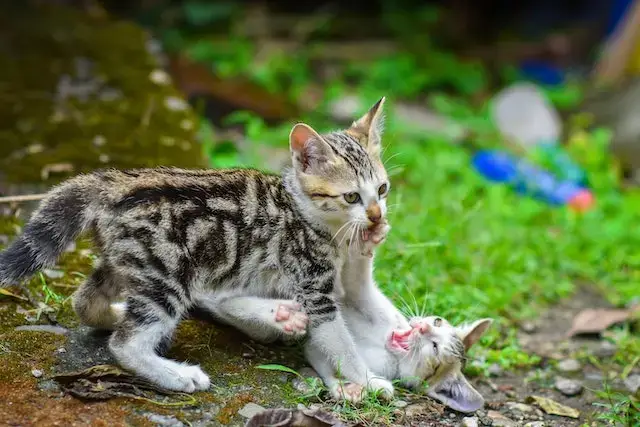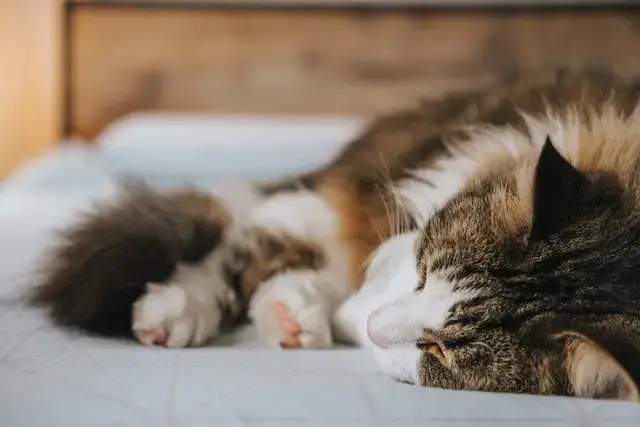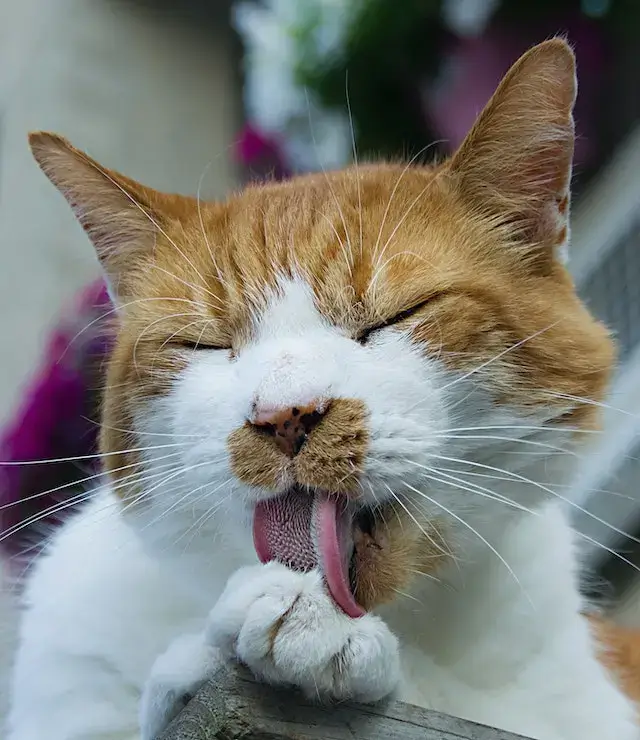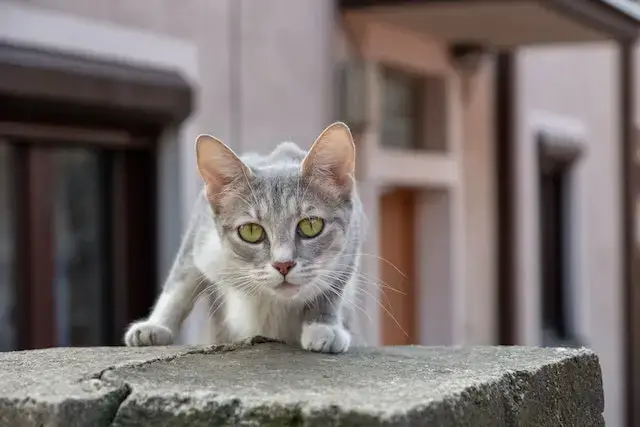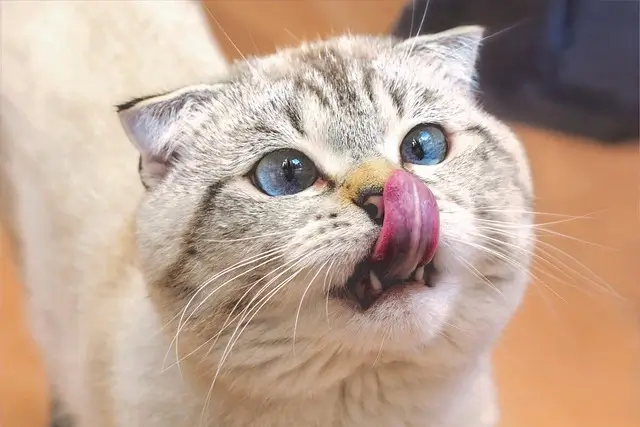If you’re someone who likes observing cats or likes seeing cat pictures on Instagram, there is one thing that would have been common to you. Cats often sleep with their tongues out.
But the question here is, why do cats sleep with their tongues out? More importantly, is this a cause for concern?
If you find yourself concerned about these aspects, then keep reading because this article aims to address all your questions.
Why Do Cats Sleep With Their Tongue Out?
Cats have a lot of reasons for a lot of things they do. While certain aspects may be concerning, others simply add to their cuteness factor.
What about your cat right now? Should you be worried or just call him cute? Now, let’s explore why cats sometimes sleep with their tongues sticking out. Have a look.
1. Lack Of Muscle Control
Sometimes this can just be a lack of muscle control, where your cat is so relaxed that she has forgotten to tuck inside his tongue.
It often happens when a cat is deep in relaxation, so much so that she leaves her mouth slightly open, sticking out her tongue.
This is not a cause for concern but, in fact, a reason to be happy. Chances are the cat is enjoying some sweet dreams while sleeping.
2. Feeling Hot Or Overheated
Sometimes a cat may stick out her tongue simply because she is feeling hot.
How do you know this? One simple way out is by looking at the weather! And then there are other signs that you can watch out for.
A cat experiencing a lot of heat will get restless and display some physical signs like darkening of the gums, which calls for some attention.
Moreover, the cat may pant, drool, and exhibit overall signs of lethargy. And then, when she sleeps, she’s going to stick out her tongue.
Must Read: How Fast Are Cats Reflexes?
3. Dehydration
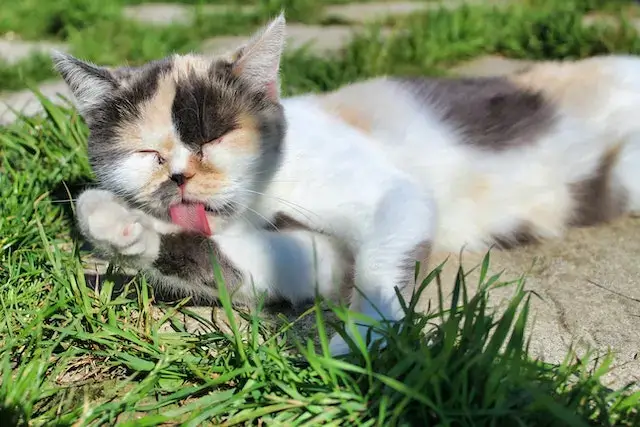
Excessive heat can leave a cat feeling dehydrated, which could be another reason for sticking his tongue out while sleeping.
Make sure your cat has constant access to fresh and clean drinking water to avoid this issue.
4. Genetics
Genetic issues are another culprit forcing the cat to sleep with his tongue sticking out of his mouth.
Sometimes your cat may have a face that is too small to hold the tongue inside. On the other hand, some cats may have a tongue that is too large to remain inside.
Some cats (like the Persian cat) come with a flat face with less room to keep the tongue inside.
These are some genetic issues that contribute to a cat sleeping with a tongue out of his mouth.
5. Respiratory Issues
Like humans, cats can have respiratory issues too, and what are these respiratory issues?
Among the most common is the feline herpes virus, particularly prevalent in young adolescent cats. Then there are fungal infections, calicivirus, bordetella bronchiseptica, feline chlamydiosis, etc.
Now, all this may sound like another language to you, so look at the symptoms. A cat suffering from respiratory issues is going to show you symptoms like coughing, sneezing, running nose, and so on.
In such cases, take the cat to the vet, and don’t ignore the tongue that sticks out of his nose while sleeping. It could be a sign of some serious respiratory issues.
And just as in the case of any respiratory issues, your cat is having trouble breathing through his nose, forcing him to sleep with his mouth open and tongue out.
While this may not always pose a problem, it can sometimes reach a stage where a cat’s breathing is compromised to the extent that the results can be fatal. So, don’t delay. Take your cat to the vet immediately.
6. Dental Issues
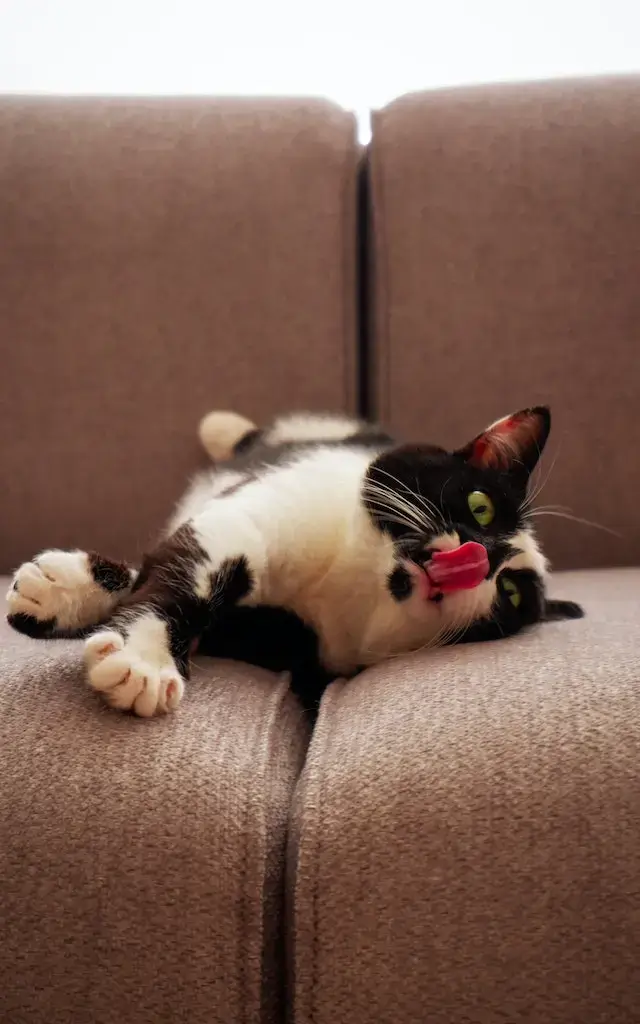
Sometimes the reason for a cat sleeping with her tongue out could be an issue in the mouth.
It could be something as simple as a little something stuck in his teeth or a swollen tongue that needs a vet’s check-up.
If your cat has dental issues, he will refuse all kinds of dried fruits and hard treats. He is also going to chew his food more slowly, sometimes even letting it drip from his mouth. Keep an eye out for these things.
7. Neurological Problems
Sometimes a cat may hang his tongue loose because of a certain neurological dysfunction, which is seen more often when the cat sleeps.
This will be accompanied by symptoms like wobbly movements, seizures, a decreased appetite, and even changes in behavior by which an owner can detect that there is a serious matter of concern.
These could be a result of several factors like trauma or simply an advance in age. Treatment here will depend on the kind of issue that the cat is facing.
Other Possible Health Problems
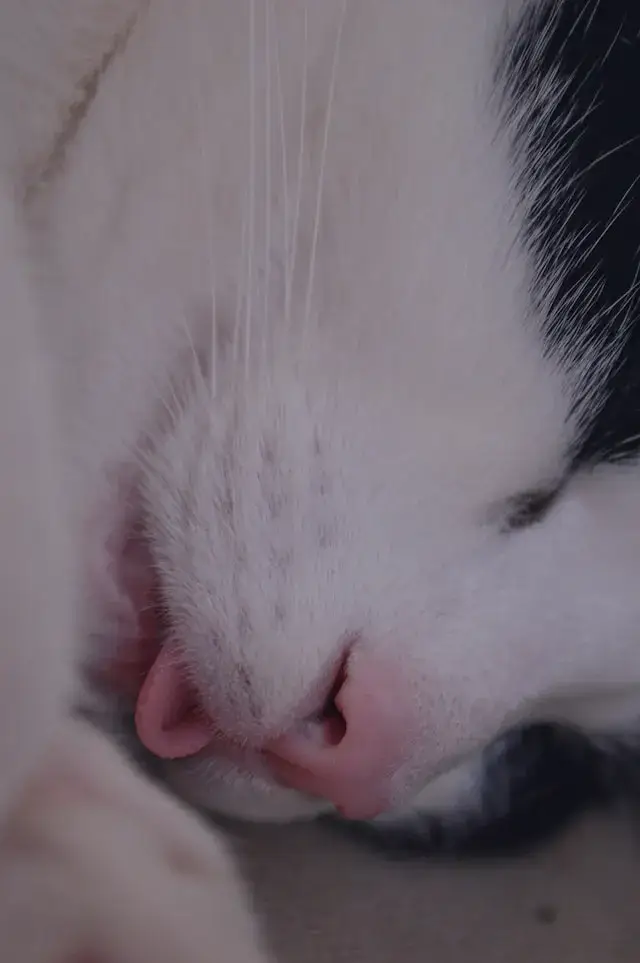
Furthermore, a few other health issues might cause your cat to sleep with its tongue sticking out. Keep reading to learn about the signs you should be aware of!
8. Swollen Tongue Due To Toxicity
A cat that has been affected in this way will often show signs of sluggishness and even move with an unsteady gait. He may even drool a lot and have sudden bouts of vomiting.
These are all symptoms of feline poisoning and can affect a cat so much that he is forced to sleep with his tongue hanging out from his mouth.
Sometimes an owner may even come across more serious symptoms like seizures and even heavy breathing.
9. Periodontal Diseases
This kind of dental disease is associated with a certain plague affecting the cat’s teeth and tongue.
One way to detect this is to observe the base of your cat’s teeth. Watch out for signs of redness or swelling, as these can suggest periodontal disease, and if that’s the case, make sure to take your cat to the vet right away.
This is a serious issue and, if not immediately treated, can even lead a cat to lose his teeth.
10. Medication Side Effects
Sometimes the medicine your cat is taking could be leading to the side effects you are seeing. While cats can sleep a lot, is your cat sleeping a little more than usual? Is he always drowsy and dozing off? Is he drooling much less than he usually does?
These are all symptoms to watch for when your cat is taking medication, apart from the tongue that you found sticking out of his mouth when sleeping.
11. Heat Stroke
Apart from sticking his tongue out of his mouth while asleep, he will show you other symptoms like panting a little more than usual, restlessness, drooling often, and frequently searching for water and shady places.
And in addition to that, she is going to sleep with her tongue out. So, when you put two and two here, you will get the answer. Take your cat to the vet at the earliest, for chances are she is having a heat stroke.
Recommended Reading: Can Cats Kill Each Other?
When to Be Concerned?
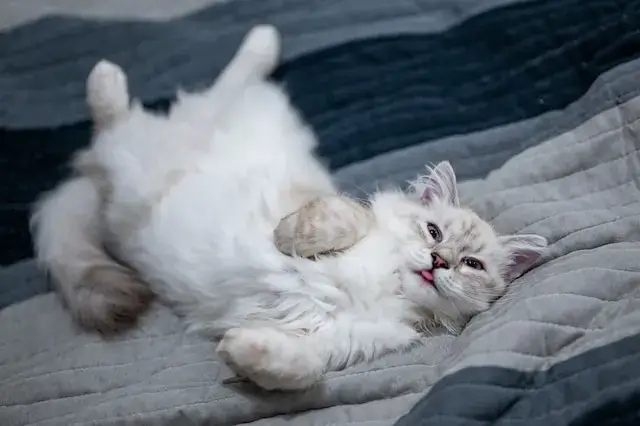
Sometimes a cat sticking out his tongue while asleep is just no cause for worry, but sometimes it is. So, how do you know the difference? Well, here it is.
If the following symptoms accompany your cat sticking out his tongue while asleep, then there is something you need to do.
- Change in sleeping position: Although it may not be a matter of concern in most cases, you should pay attention if your cat sleeps in a hunched-up position, especially when accompanied by a protruding tongue. Cats are usually found sleeping like this when they are sick.
- Snoring: While some claim that snoring in cats is typical, it’s wise to ensure there isn’t an underlying problem, particularly if your cat snores with her tongue out and does so frequently.
- Excessive drooling: Again, drooling may be something common among cats, but then again, hypersalivation? Now that is a cause for concern, more so when he is asleep and has his tongue outside his mouth and more than often.
- Restlessness: Now, this can have several reasons. It might be as straightforward as not having found a cozy spot to rest or something more concerning, such as an illness that he is unable to communicate.
- Sleeping more or less than usual: Sleeping with his tongue out is fine, but sleeping all the time, and that too with her tongue out? Now, this should call for some attention, shouldn’t it?
- Difficulty waking up: Your cat may not be sleeping the entire day, but after an entire nap with his tongue outside his mouth, is he struggling to wake up? Then that’s another reason to let the vet see him immediately.
- Panting: When your cat sleeps, he sticks out his tongue, and when he is awake, he is always panting. Doesn’t this suggest that something could be wrong? Make sure that you bring this matter to the vet’s attention to solve the problem quickly.
Do All Cats Sleep With Their Tongues Out?
All cats don’t sleep with their tongues out. But some cats do.
Some cats may sleep with their tongues out every time, others may sleep like this only sometimes, and your cat must be doing it for the first time right now.
As a new cat owner, it’s natural for you to have concerns about this matter.
Tips For Cat Owners!
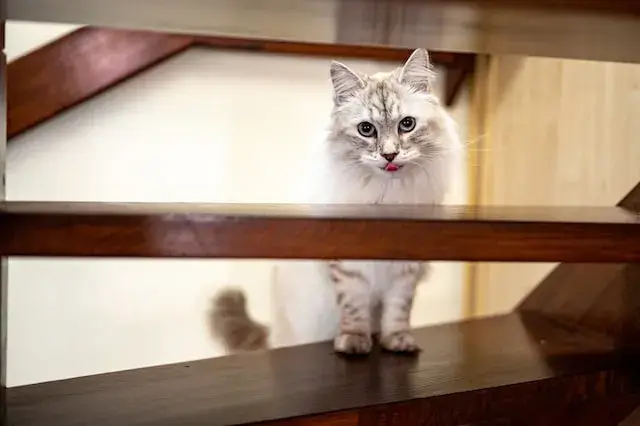
As a cat owner, loving your cat is not enough. This should also be coupled with the right amount of responsibility involved in looking after and caring for him.
If you’re new to owning a cat and finding yourself uncertain about how to get started, here are some handy tips to help you out.
1. Improving its environment: A good cat environment surrounds him with the right treats and toys he needs to stimulate himself and gives him enough exercise, lest your cat gets fat, lazy, and prone to diseases.
Also, little things can go a long way in making a cat feel loved, like a comfortable bed to sleep on or a good litter box.
2. Pay attention to your cat’s sleeping position: The sleeping position can tell a lot about your cat, so make sure you have an eye on how she sleeps.
Although many positions are acceptable, it is important to be wary of the hunched-up position, as it indicates that the cat is not doing well.
3. Check Your Cat’s Nasal Passage: Remember that cats are like babies, and just as a mother is constantly checking her baby’s nose and other vital organs, this is something you should be doing as a cat owner.
Remember that a cat’s nose can also say a lot about his health. Check for things like excessive nasal discharge or a nose that is too dry. Both are dangerous and to be looked out for.
4. Make sure your cat is comfortable: While cats are loving and playful, they are also shy. So, don’t force them on strangers; let them stare at them from their hiding place under the chair. Allow them some time, and they will eventually emerge.
Remember that a cat calms down while she hides. Food can be one way to build trust, after which you can slowly move to some interactive play.
5. Regular Check-Ups with Your Vet: When you have a cat, regular visits to the vet become a part of your life, at least if you love your pet. Vaccines and check-ups are some things you will have to do on a timely basis.
This way, you will prevent unnecessary illnesses as you receive the right inputs and advice on his health and diet.
6. Avoid Extreme Temperatures: Like human beings, cats, too, cannot survive extreme temperatures. Go below 21 degrees, and he is going to be too cold. Go above 37 degrees C, and he is probably going to get a heat stroke.
Now that you’re aware of the ideal temperature for your cat, it’s your responsibility to ensure their comfort in your home.
7. More water intake: Remember that a water bowl is something you should buy at the same time you adopt your cat, and ensure that it is always filled with clean water.
Place it in a spot he frequents so he can take occasional sips and not get dehydrated in time.
Closing Thoughts: Why Do Cats Sleep With Their Tongue Out?
Cats look cute, and certain things they do make them cuter, like sleeping with their tongues out.
As a cat owner, you gotta know when to chill and just enjoy their cute antics and when it’s time to step in and do what’s needed.
Reading up till here would surely have taught you the difference, so make sure that you remember everything and put it to the right practice.
Now, go have a check to see how your kitty is doing.
Frequently Asked Questions
Q1. Why Do Cats Stick Their Tongue Out While Playing?
Ans: Cats are playful and curious beings with strong hunting instincts, and so a cat playing with his tongue out is most likely gathering all possible information around him. However, if it happens a little more often, it can suggest a dental and oral disease, so this is looked into and seen.
Q2. Why Do Cats Stick Their Tongue Out When You Pet Them?
Ans: Cats are not just playful and curious but also very loving and affectionate, so she is sticking out her tongue when seated on your lap right now because she loves the attention she is getting. It is a sign of pure bliss, which she is at the moment feeling.
Q3. Why Is My Cat Sleeping With His Mouth Open?
Ans: As seen above, this can come with several reasons, and to decide which of the above is true in the case of his cat, one needs to pay a little attention to the cat’s actions throughout the day and the way he is behaving. Do this so you can give the right report to the vet if he needs a little checking.
Q4. Cat Tongue Sticking Out Not Eating: What is it?
Ans: This situation can be quite concerning, and it’s important to address it seriously. Your cat is most likely to have periodontal disease or some other issue with his gums and teeth, so it would be good to take him to the vet immediately.
Q5. Why Is My Cat Panting With Tongue Out?
Ans: There could be various reasons for this. Maybe your cat is just really excited and in the mood for some playtime. Or it could mean there’s something more worrisome going on, like a potential illness. As an owner, you must detect and decide, and if you can’t, then take him to the vet.
Q6. How Can I Tell If My Cat’s Tongue-Out Sleeping Is Normal Or Abnormal?
Ans: Well, you didn’t know when you came to read this article, but now that you’ve come so far, you know. If not, take a careful look at all the symptoms mentioned above and assess whether your cat is exhibiting any of them. Then you can tell if your cat sleeping with his tongue out is normal.

